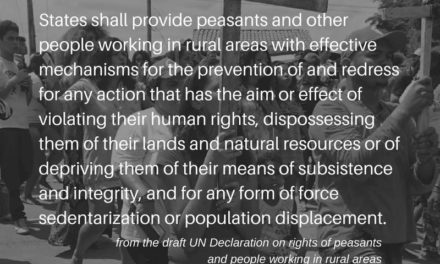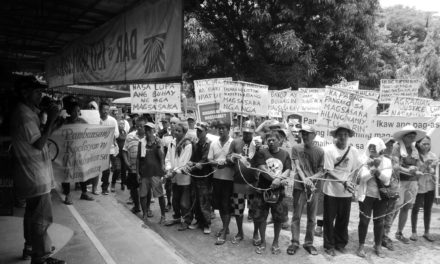During this year’s observance of the International Day of Rural Women, the most vulnerable women—landless rural workers, small farmers, fisherfolks, and indigenous women—have a common aspiration: access to information. Rural women are now aware of the power of information. Access to information and demands for transparency and disclosure are crucial components of their campaigns—be it against large-scale mining, land grabbing and land investment deals, or engaging government in decision-making, especially on the five percent gender and development budget. The continuing absence of a Freedom of Information (FOI) law has stifled rural women’s efforts to shed light on the local consequences of development projects and programs, and has hampered the active promotion and protection of their rights and access to productive resources.
As the Philippines battles the scandals wrought by a system that engenders corruption, resulting in waste public money funds, small rice farmers such as Trinidad Domingo, who hails from Nueva Ecija and who was recently affected by typhoon Santi, clamor for the passage of the people’s Freedom of Information (FOI) Act. “Kung may FOI, masisiguro na hindi ganito ang pandarambong na ginagawa ng ating pamahlaan.” (If there’s FOI, we can ensure that the plunder of public funds in government will be avoided) For her, the FOI will empower women so that they can directly protect their hard-earned resources that were entrusted to government. The FOI is a tool that will allow ordinary citizens to demand transparency and accountability from government, especially on how public resources are allocated, how development projects are chosen and for what purposes. For rural women, this includes agricultural policies and actions taken by government such as the recent move to import rice. The lack of full disclosure on the state of food (in) security begs to question such move, especially when government claims that the country can achieve rice self-sufficiency by 2014.
Confronting Invisibility and Vulnerability
Rural women are considered a vulnerable group primarily due to their unique role as food producers and providers. According to the Food and Agricultural Organization, “women are involved in every stage of food production…women do most of the work involved in sowing, weeding, fertilizing and harvesting the staple crops – such as rice, wheat and maize – which allows for more than 90 percent of the rural poor’s diet.”[i] According to the World Women’s Report[ii], rural women rely mostly on natural resources and the immediate environment for their sustenance. Seventy-five percent of households in Asian countries (including the Philippines) rely on firewood and “biomass” such as wood, agricultural crops, wastes and forest resources for their energy and livelihood.
According to Rosario “Ka Sario” Mendoza, a fisher folk from Naic, Cavite and chair of NAMAMANGKA, a people’s organization which promotes the recognition of women as fishers, “the ability of women to cope with poverty by relying on dwindling resources due to over-exploitation and environmental degradation has been further diminished.” Women fisher folk in particular are baffled by the type of rural development promoted by the Philippine government—mangroves are destroyed to pave way to highways and roads and fisher folk are displaced in the name of this development.
But rural women are confronting poverty head on and are helping themselves in the absence of government intervention. Ka Sario, for instance, has launched a micro-enterprise on sardines manufacturing project and has conducted various leadership training sessions for women in her community and beyond, especially on rural women’s rights, domestic violence and abuse. Rural women are turning their deep frustrations into positive efforts by calling on government to not only recognize their contribution to food security and development of the country but also to advance agro-ecology and sustainable agriculture. Rebecca Miranda, a small farmer from Cabanatuan City, Nueva Ecija, hopes that the Philippine government seriously takes on organic farming as mandated by the Organic Agriculture Act of 2010 or Republic Act 10068. “Nakakadismaya dahil malakas pa rin ang programa ng hybrid commercialization at GMO. Maliit pa rin ang pondo ng pamahalaan na napupunta sa organikong pagsasaka” (It’s dismal that the hybrid commercialization program and GMO remain strong. Organic farming gets little public funds.)
Front liners
Rural women are at the forefront of many campaigns and political actions. As political agents of change, rural women see their identity as key in the recognition of their rights to access and control resources. PKKK, (National Rural Women Coalition), a coalition of organizations and federations of associations of women peasant, fisher folk, farm workers, and indigenous peoples; including rural women in the sectors of informal labor, elderly, youth, and persons with disabilities campaigned for the rural women’s rights to land, which was recognized by law for the first time in 2009. Sections 2, 14 and 15 of RA 9700 or the Comprehensive Agrarian Reform Program Extension with Reforms (CARPER) also states that:
“Rural women refer to women who are engaged directly or indirectly in farming and/or fishing as their source of livelihood, whether paid or unpaid, regular or seasonal, or in food preparation, managing the household, caring for the children, and other similar activities…. Support services shall be extended equally to women and men agrarian reform beneficiaries…. The PARC shall likewise adopt, implement, and monitor policies and programs to ensure the fundamental equality of women and men in the agrarian reform program as well as respect for the human rights, social protection, and decent working conditions of both paid and unpaid men and women farmer-beneficiaries…The PARC shall ensure that these support services, as provided for in this act, integrate the specific needs and well-being of women farmer-beneficiaries taking into account the specific requirements of female family members of farmer-beneficiaries.”[iii]
Judy Pasimio of LILAK, (Purple Action for Indigenous Women’s Concerns), a feminist collective promoting the rights of indigenous rural women, emphasized the need for the freedom of information, for inclusive rural development, sustainable agriculture and agro-ecology, protection of women’s rights, and alternatives to mining and extractives, underscored indigenous women’s struggle in defense of their lives and livelihoods against large-scale mining. The plunder of resources caused by mining, logging and other extractives has gender-differentiated impacts. According to her, “the plunder also is about robbing people’s lives, especially indigenous women’s”. Based on LILAK’s monitoring, since 2010, 28 indigenous leaders have been killed in their struggle to protect their ancestral domains. Juvy Capion, a B’laan leader who fought against the mining giant Sagittarius Mines, Inc. (SMI), was killed in 2012. SMI was given the right by the Philippine government under the Mining Act of 1995 the permit to extract gold and copper in the provinces of South Cotabato, Sultan Kudarat and Davao del Sur in southern Philippines, which spans an area of 23,571 hectares and covers the ancestral domains of the B’laan tribe. Instead of the Mining Act of 1995, LILAK and other anti-mining groups such as Alyansa Tigil Mina call for the passage of the Alternative Minerals Management Bill and a related National Land Use Policy.
Comprehensive Vision and Agenda
Women belonging to PKKK and Lilak envision a society free from discrimination and violence; where women can enjoy economic and social equality; are not discriminated according to race, age, beliefs and gender; benefit from a pro-poor development that fulfills the human rights and wellness of everyone; the value of their productive and reproductive work recognized.
PKKK has come up with nine major themes for its campaigns and advocacy, namely: fulfilling and advancing rural women’s rights in agrarian reform, ancestral domains, coastal resources; access to safe and adequate food, potable water, and basic services; access to sustainable and women-friendly agriculture and fishery support services; representation and participation in the implementation of gender-oriented and development programs and local sectoral representation; promotion of reproductive rights; protection from all forms of violence and other oppressive gender relations; a rural women’s peace agenda, especially in Mindanao; and protection from impacts of climate change and right to safe environment. At the same time, these women are carving out spaces to not only survive but also to advance their agenda. In the words of Mary delos Santos, president of PKKK and a home-based worker, “despite poverty and sufferings, we, women continue to struggle to challenge and overcome poverty and on this important day, we call upon government to heed our call and demands. Access to information is key in realizing our agenda, in recognizing rural women’s contribution and making us visible. That is our bottomline.”#
*Based in Manila, Mary Ann Manahan is a program officer with Focus on the Global South. She works on the commons (land and water) and investment issues. Mary Ann acknowledges the valuable inputs of Daryl Leyesa of PKKK, Judy Pasimio of Lilak and Clarissa Militante of Focus. She maybe reached at [email protected].
[i] Association for Women’s Right in Development (AWID). “Africa’s Latest Land Rush: The Effect Of Land Grabs On Women’s Rights”, October 2, 2011. Available:
http://www.awid.org/News-Analysis/Friday-Files/Africa-s-Latest-Land-Rush-The-Effect-of-Land-Grabs-on-Women-s-Rights, Accessed on October 25, 2013.
[ii] United Nations Statistics Division. World’s Women 2010: Trends and Statistics. (New York: United Nations: 2010)
[iii] Republic Act 9700, http://www.lawphil.net/statutes/repacts/ra2009/ra_9700_2009.html. Accessed October 25, 2013.








